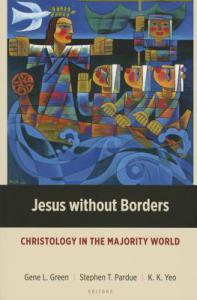 Jesus without Borders: Christology in the Majority World, Gene L. Green, Stephen T. Pardue, K.K. Yeo eds. Grand Rapids, Wm. B. Eerdmans, 2014.
Jesus without Borders: Christology in the Majority World, Gene L. Green, Stephen T. Pardue, K.K. Yeo eds. Grand Rapids, Wm. B. Eerdmans, 2014.
Summary: Eight theologians from different parts of the world came together for a theological dialogue on Christology, engaging the Chalcedonian definition of Christology and reflecting on the unique perspective they bring on Christology from their part of the world.
One of the most exciting developments of the last fifty years is the rapid growth of Christianity outside of Europe and North America. With this growth has come thoughtful scholars and church leaders representing these movements in the Majority World. What they bring is the unique perspective of each of their cultures that brings fresh light and fresh insight into theological discussions, which in the past, have only been shaped by a western Christian intellectual tradition. This book represents the first in a series of books on Majority World Theology that came out of a theological consultation focused on Christology, what we believe about who Christ is and what he has done.
The organizers of this consultation decided that they would consider the Chalcedonian definition of the person of Jesus as one person existing in two natures, human and divine that are neither mixed nor separated. They were then asked to reflect on the unique contribution each participants cultural perspective brings on how they understand Christ. Kevin Van Hoozer begins with a paper outlining the Western theological discussion of Christology from Chalcedon to the present considering the “Christ from within†Christologies of Schleiermacher and Ritschl, kenotic theologies, the “Christ of history†theologies, down to the narrative approaches of Hans Frei. and Barth’s approach of understanding everything else through the lens of Christology. What he contends is necessary for the global discussion is to “go on in the same way†from Chalcedon, and yet with a plurality of tongues and voices speaking of the One Lord.
The essays then follow in two groups, first focused more around systematic theology, and second around biblical theology. Victor Ezigbo reviews African Christologies, which he categorizes as “neo-missionary†Christologies which retain some reservations about African culture while attempting to relate to the African context; ancestor Christologies, likening the mediatory role of Christ to that of ancestors, and his own approach of revealer Christology which emphasizes Christ’s sufficiency to communicate and interpret life. Timothy Gener surveys Christologies in the Asian context, building off of the multiple perspectives on Christ in the gospels and New Testament. He contends for multiple Christologies that reflect local contexts and multiple religious traditions so long as these aid in Christian discipleship. Jules A Martinez-Olivieri then addresses the Latin context where liberation Christologies give weight to the actions of Jesus over the transcendent aspects of his nature.
The second half of the book then turns to biblical theology. Yohanna Katanacho surveys the gospel of John and the New Beginning that consists in cleansing, a new Holy Space, Holy Time, Holy Experience, Holy People in a new Holy Land, that while rooted in Jewishness represents humanity as a whole in radical inclusiveness. Aida Besancon Spencer considers the veneration of Mary in Latino/a contexts reflecting a false perception of the unapproachability of Jesus when he is in fact intercessor par excellence. Andrew M. Mbuvi discusses African elements in a reading of 1 Peter around blood sprinkling, the lamb of God, and the “spiritual state†of Jesus between death and resurrection and the hope this gives for ancestors.
K.K. Yeo concludes this volume with a review of the discussion reminding readers of the different Christologies of the four canonical gospels and makes his own contribution of directions in Chinese Christology focusing on dao, a Chinese version of logos, renren (meaning “who lovesâ€) a Christology of relationship, and image of God Christology.
In recent years, there has been a resurgence of Trinitarian theology, reflecting the idea that the conciliar formulations are not the final word on the Trinity. Likewise, I was impressed in these papers that the theological work of these scholars from the Majority world can greatly enrich our conception of the person and work of Christ, bringing to our attention neglected aspects. At the same time, both Van Hoozer and Yeo bring up the issues of orthodoxy as we explore plural expressions of Christology. It actually seems that conversations like this theological forum are crucial of sharpening and balancing different expressions and looking at the common scriptures together as we do so. As the opening work of the series on Majority World Theology, this volume set a high standard of rich and vigorous discussion we might have around our One Lord.
Thank-you to Wm. B. Eerdmans for the opportunity to review Jesus without Borders: Christology in the Majority World. Bob Trube first posted the review on Bob on Books. Stay tuned for more book reviews from our growing team of contributors. Note: If you have interest in writing book reviews and/or interviewing authors, please email the Emerging Scholars Network :) ~ Thomas B. Grosh IV, Associate Director, Emerging Scholars Network
Bonus: Eerdmans Author Interview of Gene L. Green & K.K. Yeo (17:33) . . .
About the author:
Bob Trube is Associate Director of Faculty Ministry and Director of the Emerging Scholars Network. He blogs on books regularly at bobonbooks.com. He resides in Columbus, Ohio, with Marilyn and enjoys reading, gardening, choral singing, and plein air painting.
